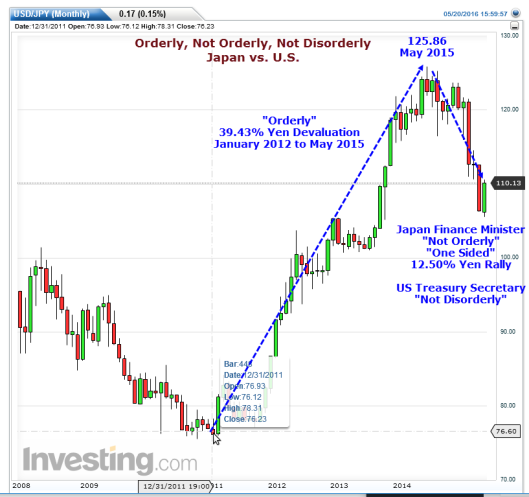The word for today is “orderly”.
That word came up many times this week in a feud between the US and Japan at another useless G7 meeting on global growth and competitive currency devaluations.
As is typical, the finance ministers and central banks ended the two-day meeting without making any policy agreements.
The meeting was not a complete failure. It did provide entertainment value on the meaning of “orderly”.
Please consider U.S., Japan Clash Over Yen Policy at G7 Meeting:
Group of Seven finance ministers and central bank chiefs ended a two-day meeting without an agreement on a more balanced policy mix, including additional, possibly coordinated fiscal stimulus, and aligning divergent monetary policies.
Tokyo and Washington clashed over whether Japan should be allowed to arrest the yen’s recent rise.
Japanese Finance Minister Taro Aso said Saturday that he expressed concern about what he termed excessive movements in the yen to his counterpart, U.S. Treasury Secretary Jack Lew, on the sidelines of the meeting. Mr. Aso said he told Mr. Lew that “one-sided, speculative trades” have been seen in the market, something that Tokyo considers undesirable.
“The movement seen over the past several weeks can’t be described as ‘orderly,’” Mr. Aso said at a news conference, reflecting his position that intervention may be warranted.
U.S. officials have disagreed with Japan’s assessment of the market, saying the currency moves have been orderly.
In a compromise, G7 has left individual countries to devise their own policy programs to contribute to stronger global growth.
In line with its recent practice, the group issued no joint written statement.
Not “Disorderly” Says Treasury Secretary Lew
For a discussion on the meaning of “disorderly”, let’s put a spotlight on U.S., Japan Disagreement on Yen Moves Overshadows G7 Meeting:
The United States issued a fresh warning to Japan against intervening in currency markets on Saturday as the two countries’ differences over foreign exchange overshadowed a Group of 7 finance leaders’ gathering in the Asian nation.
The rift was on full show at the G7 finance leaders’ meeting in Sendai, northeastern Japan, with U.S. Treasury Secretary Jack Lew saying he did not consider current yen moves as “disorderly” after a bilateral meeting with his Japanese counterpart.
“It’s important that the G7 has an agreement not only to refrain from competitive devaluations, but to communicate so that we don’t surprise each other,” Lew told reporters on Saturday. “It’s a pretty high bar to have disorderly (currency) conditions.“
Orderly and Not Disorderly in Pictures

Four Terms Explained
- Orderly
- Not Orderly
- Disorderly
- One Sided
Confusion should now be over. The above chart fully explains everything you need to know about “orderly” and all of its derivatives.
The compromise G7 solution was to do nothing. The group did not even issue a policy statement. How can you issue a statement when you can’t even agree on terms?
From a taxpayer perspective these meetings ought to be cancelled. As always, it’s clear every country will do what it wants, including having widely differing interpretations of “orderly” and “one sided”.
The only benefit to these meetings is entertainment value for economic writers. Yet, that’s something the Wall Street Journal, MarketWatch, Bloomberg, and Reuters did not even take advantage of.
